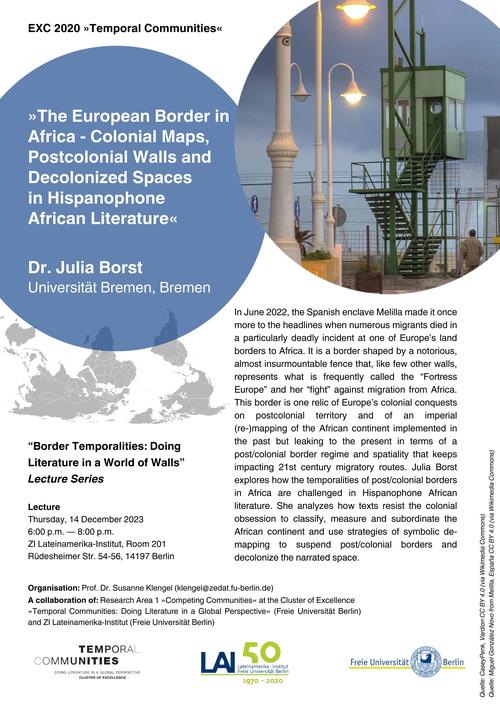Vortrag | The European Border in Africa – On Colonial Maps, Postcolonial Walls and Decolonized Spaces in Hispanophone African Literature
Organised by Susanne Klengel, project Border Temporalities and/in Literature, Research Area 1: "Competing Communities" in cooperation with the Institute of Latin American Studies at the Freie Universität Berlin. This event is part of the lecture series "Border Temporalities: Doing Literature in a World of Walls".
Speaker: Dr. Julia Borst (University of Bremen)
- Lecture in English -
In June 2022, the Spanish enclave Melilla made it once more to the headlines when numerous migrants died in a particularly deadly incident at one of Europe’s land borders to Africa. It is a border shaped by a notorious, almost insurmountable fence that, like few other walls, represents what is frequently called the “Fortress Europe” and her “fight” against migration from Africa. This border is one relic of Europe’s colonial conquests on postcolonial territory and of an imperial (re-)mapping of the African continent implemented in the past but leaking to the present in terms of a post/colonial border regime and spatiality that keeps impacting 21st century migratory routes. Julia Borst explores how the temporalities of post/colonial borders in Africa are challenged in Hispanophone African literature. She analyzes how texts resist the colonial obsession to classify, measure and subordinate the African continent and use strategies of symbolic de-mapping to suspend post/colonial borders and decolonize the narrated space.
While the European Union keeps pushing migrants back behind these border walls, literature allows us to peek behind them, humanizing the anonymous narrative of African migration in the European public sphere and endowing it with a human face.
Dr. Julia Borst is currently the postdoctoral researcher deputy director of the Institute of Postcolonial and Transcultural Studies (INPUTS) at University of Bremen. In 2023 she received the ERC Starting Grant for “Afroeurope and Cyberspace” and in 2018 an Individual Research Grant of the German Research Foundation (DFG) for “The Spanish Black Diaspora: Afro-Spanish Literature of the 20th and 21st Century”. She was awarded the Abioseh Porter Best Essay Award in 2023 and the Heinz Maier-Leibnitz Prize in 2021, among others. Julia Borst is the author of a monography on violence and trauma in contemporary Haitian novels and numerous articles in international peer-reviewed journals. She co-edited various special issues (e.g. in Research in African Literatures, Journal of Global Diaspora and Media) and essay collections, e.g. Women’s Perspectives on (Post)Migration: Between Literature, Arts and Activism, Between Africa and Europe (2023). Her research interests are Caribbean literatures, Hispanophone African literatures, Equatorial Guinea, Afroeuropean studies, diaspora studies and migration studies, postcolonial and decolonial theory, diasporic communities and (post)digitality, violence and trauma in literature, multidirectional memories and the Global South, ecocriticism.
Zeit & Ort
14.12.2023 | 18:00
ZI Lateinamerika-Institut | Raum 201
Rüdesheimer Str. 54-56, 14197 Berlin
